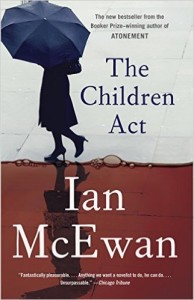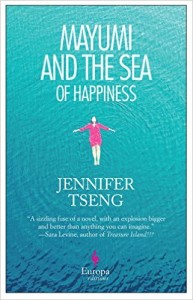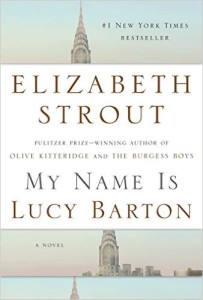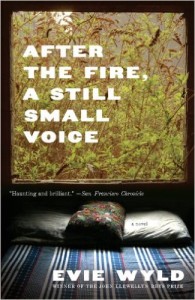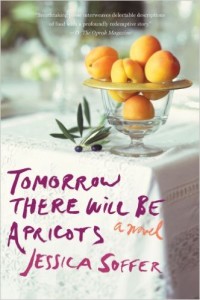The weather is getting cooler and the days are getting shorter, so it’s time to lay low and dig in to some good books. Here are some recommendations from my last batch of reading, with more coming in a separate post soon. I’ve been trying to make my way through the Man Booker shortlist, so the first three here are from that list, along with two others. (Full disclosure: I didn’t read the winning book – maybe more on that in a subsequent post.) Enjoy!
4 3 2 1 by Paul Auster
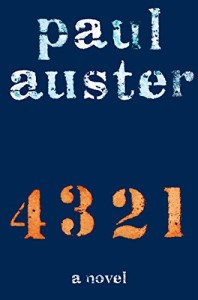 This magnificent book left me speechless by the end. Shortlisted for the Man Booker, this novel is impressively muscular, bold, and massive in scale. It’s also very male (yes, there are female characters but they’re always assessed by how much the main character wants to sleep with them), not what I usually love. But love it I did. This is a huge novel, both in terms of page count but also ambition. Auster begins with a character, a sort of Jewish American everyman, born to two parents, grandson to grandparents, none of which is particularly remarkable. Their family history is recounted, including how their family name is arrived at, based on an old Jewish joke we’ve all heard. But from there it gets really interesting, if at moments somewhat confusing (keep plugging through – don’t give up!). Each subsequent chapter is divided into four, as in 1.1, 1.2, 1.3, 1.4, and so on. Each of those four subchapters is a different trajectory of the life of the main character, four different possible routes through life he could have traveled, depending on circumstances, choices, and quirks of fate. There’s a pinch of Philip Roth, a little John Updike, even some Forest Gumpian travels through American history with the main character being in just the right place at the right moment. Though it may sound contrived, Auster is a master and in his hands this construct is heartbreaking, engaging, funny, and poignant. And by the conclusion, he has brought it all together so elegantly so that it suddenly all makes sense. Don’t be put off by the size – the effort is well worth it. ©©©
This magnificent book left me speechless by the end. Shortlisted for the Man Booker, this novel is impressively muscular, bold, and massive in scale. It’s also very male (yes, there are female characters but they’re always assessed by how much the main character wants to sleep with them), not what I usually love. But love it I did. This is a huge novel, both in terms of page count but also ambition. Auster begins with a character, a sort of Jewish American everyman, born to two parents, grandson to grandparents, none of which is particularly remarkable. Their family history is recounted, including how their family name is arrived at, based on an old Jewish joke we’ve all heard. But from there it gets really interesting, if at moments somewhat confusing (keep plugging through – don’t give up!). Each subsequent chapter is divided into four, as in 1.1, 1.2, 1.3, 1.4, and so on. Each of those four subchapters is a different trajectory of the life of the main character, four different possible routes through life he could have traveled, depending on circumstances, choices, and quirks of fate. There’s a pinch of Philip Roth, a little John Updike, even some Forest Gumpian travels through American history with the main character being in just the right place at the right moment. Though it may sound contrived, Auster is a master and in his hands this construct is heartbreaking, engaging, funny, and poignant. And by the conclusion, he has brought it all together so elegantly so that it suddenly all makes sense. Don’t be put off by the size – the effort is well worth it. ©©©
History of Wolves, by Emily Fridlund
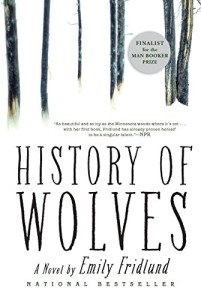 A Man Booker shortlist title, this is one weird, fairytale-like novel. Written in an almost-but-never-quite-confusing elliptical style that wraps around itself in the telling, this is both a coming of age story of Linda, a young teenager living a solitary, rural life at the edge of a lake in Northern Minnesota, and also a story about parenting, and how parents do, or don’t, take care of their children. Linda’s parents are former members of a failed commune who stayed on when everyone has left. She lives on a dirt road edged by sumac trees and spends a great deal of her time alone, in the woods or in a canoe. There are two tales of possible wrongdoing at the heart of the plot – a pedophile teacher on whom she develops a strange obsession, even a fondness, and a family of city people who come to stay at their country cabin across the lake with their four year old son Paul. There are hints right from the beginning that tragedy is going to strike, with mentions of a future trial in which Linda will play a role. As the story spins out, with glimpses along the way of Linda’s adult life, she tests out ideas about friendship, loyalty, love, and sexuality. This book is delicately beautiful, in a way that seems like it might crumble when touched, and yet there is a tough center at the heart of it that holds it all together. ©©
A Man Booker shortlist title, this is one weird, fairytale-like novel. Written in an almost-but-never-quite-confusing elliptical style that wraps around itself in the telling, this is both a coming of age story of Linda, a young teenager living a solitary, rural life at the edge of a lake in Northern Minnesota, and also a story about parenting, and how parents do, or don’t, take care of their children. Linda’s parents are former members of a failed commune who stayed on when everyone has left. She lives on a dirt road edged by sumac trees and spends a great deal of her time alone, in the woods or in a canoe. There are two tales of possible wrongdoing at the heart of the plot – a pedophile teacher on whom she develops a strange obsession, even a fondness, and a family of city people who come to stay at their country cabin across the lake with their four year old son Paul. There are hints right from the beginning that tragedy is going to strike, with mentions of a future trial in which Linda will play a role. As the story spins out, with glimpses along the way of Linda’s adult life, she tests out ideas about friendship, loyalty, love, and sexuality. This book is delicately beautiful, in a way that seems like it might crumble when touched, and yet there is a tough center at the heart of it that holds it all together. ©©
Exit West, by Mohsin Hamid
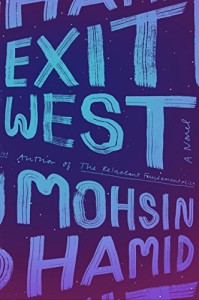 Having read this long before the Man Booker list was published, I was thrilled to see it wind up on the shortlist (its also a finalist for the Kirkus Prize). This hauntingly gorgeous novel could not be more timely, which is quite a feat given how long it takes to write and publish a novel. This one too had a fairy tale quality to it – almost like a modern day refugee version of Hansel and Gretel. Nadia and Saeed are two young people who meet in a city in a middle eastern country. At first their lives are almost recognizably universal as they study, work, smoke pot, and become increasingly intimate. But things change quickly as the unrest of civil war dramatically changes the landscape of their city and their lives. Soon their lives have turned upside down as they deal with checkpoints, violence, scarcity, and fear. Like so many others in that situation, they decide they have to leave and get out to the West, and they discover a network of secret doors that lead to other countries. The technique of metaphoric made real employed by Hamid is similar to the model used in Underground Railroad by Colson Whitehead in which he envisions an actual railroad running underneath the ground to take slaves to safety. There are no boats or planes or weeks of walking to get to the West, here there are actual doorways that open up onto new vistas and possibilities, though not always with expected outcomes. Nadia and Saeed make their way through several landings as they cope with the uncertainty of life as unwanted strangers. Each exit and entrance changes them, and they painfully figure out how become themselves in the process. ©©©
Having read this long before the Man Booker list was published, I was thrilled to see it wind up on the shortlist (its also a finalist for the Kirkus Prize). This hauntingly gorgeous novel could not be more timely, which is quite a feat given how long it takes to write and publish a novel. This one too had a fairy tale quality to it – almost like a modern day refugee version of Hansel and Gretel. Nadia and Saeed are two young people who meet in a city in a middle eastern country. At first their lives are almost recognizably universal as they study, work, smoke pot, and become increasingly intimate. But things change quickly as the unrest of civil war dramatically changes the landscape of their city and their lives. Soon their lives have turned upside down as they deal with checkpoints, violence, scarcity, and fear. Like so many others in that situation, they decide they have to leave and get out to the West, and they discover a network of secret doors that lead to other countries. The technique of metaphoric made real employed by Hamid is similar to the model used in Underground Railroad by Colson Whitehead in which he envisions an actual railroad running underneath the ground to take slaves to safety. There are no boats or planes or weeks of walking to get to the West, here there are actual doorways that open up onto new vistas and possibilities, though not always with expected outcomes. Nadia and Saeed make their way through several landings as they cope with the uncertainty of life as unwanted strangers. Each exit and entrance changes them, and they painfully figure out how become themselves in the process. ©©©
Anything is Possible, by Elizabeth Strout
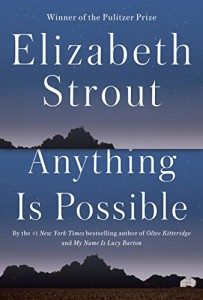 It’s always a good day when there’s a new Elizabeth Strout book published, and this one is based on a particularly delicious construct. In her most recent book before this one, My Name is Lucy Barton, Strout wrote about a woman who had left a troubled family background to move to New York, where she marries, has children, and eventually winds up in the hospital. While in the hospital, her estranged mother comes to visit her and they talk about people they know from back home. This novel, Anything is Possible, is about those people whose names dot the pages of My Name is Lucy Barton, as does Lucy herself. This book is really a collection of loosely connected stories about all the different people spoken about by Lucy and her mother, including her sister and brother. And many of the stories recounted here connect in different ways to Lucy and the persona of Lucy, that is, someone who left their hometown to go to New York and write books, someone who “got out.”. There is even a reference to a character going into a local bookstore and seeing Lucy’s book, with the cover described exactly as the actual cover of My Name is Lucy Barton. Strout has created a complete ecosystem with these two books that ping off of each other. But even without the connection to My Name is Lucy Barton, these tales are beautiful, moving, and so intricately, precisely, heartbreakingly crafted. ©©©
It’s always a good day when there’s a new Elizabeth Strout book published, and this one is based on a particularly delicious construct. In her most recent book before this one, My Name is Lucy Barton, Strout wrote about a woman who had left a troubled family background to move to New York, where she marries, has children, and eventually winds up in the hospital. While in the hospital, her estranged mother comes to visit her and they talk about people they know from back home. This novel, Anything is Possible, is about those people whose names dot the pages of My Name is Lucy Barton, as does Lucy herself. This book is really a collection of loosely connected stories about all the different people spoken about by Lucy and her mother, including her sister and brother. And many of the stories recounted here connect in different ways to Lucy and the persona of Lucy, that is, someone who left their hometown to go to New York and write books, someone who “got out.”. There is even a reference to a character going into a local bookstore and seeing Lucy’s book, with the cover described exactly as the actual cover of My Name is Lucy Barton. Strout has created a complete ecosystem with these two books that ping off of each other. But even without the connection to My Name is Lucy Barton, these tales are beautiful, moving, and so intricately, precisely, heartbreakingly crafted. ©©©
Stay With Me, by Ayobami Adebay0
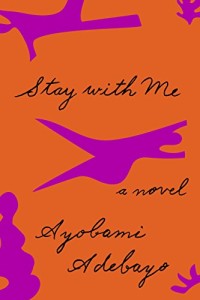 Set in Nigeria, this energetic first novel tells the story of a marriage from the perspective of both the wife and the husband. Yejide and Akin meet as students and fall in love, despite familial and societal pressures that might keep them apart. And yet a simple romance this is not. There is a secret, or really a series of secrets, at the heart of this marriage that is revealed little by little as the story progresses, and it is only at the end that all becomes clear. It is above all a love story of two people trying to protect each other and themselves, a story of passion and shame and the falsehoods we tell in order to keep everything from crashing down around us. And as the narrative switches perspectives back and forth, it is also a tragic story of how much can go wrong between women and men when pride and customs and historic cultural norms and gender roles get in the way of trust and open communication. The writing is full of beautiful descriptions of longing and sensuality, the way people look at and see each other, and what happens over time as a result of deep anger, grief, and hurt. I look forward to seeing more from this author. ©©
Set in Nigeria, this energetic first novel tells the story of a marriage from the perspective of both the wife and the husband. Yejide and Akin meet as students and fall in love, despite familial and societal pressures that might keep them apart. And yet a simple romance this is not. There is a secret, or really a series of secrets, at the heart of this marriage that is revealed little by little as the story progresses, and it is only at the end that all becomes clear. It is above all a love story of two people trying to protect each other and themselves, a story of passion and shame and the falsehoods we tell in order to keep everything from crashing down around us. And as the narrative switches perspectives back and forth, it is also a tragic story of how much can go wrong between women and men when pride and customs and historic cultural norms and gender roles get in the way of trust and open communication. The writing is full of beautiful descriptions of longing and sensuality, the way people look at and see each other, and what happens over time as a result of deep anger, grief, and hurt. I look forward to seeing more from this author. ©©
Rating System
©©© – Amazing Book, dazzling, blew me away
©© – Great Book, deeply satisfying
© – Good Book, but I wanted it to be even better

